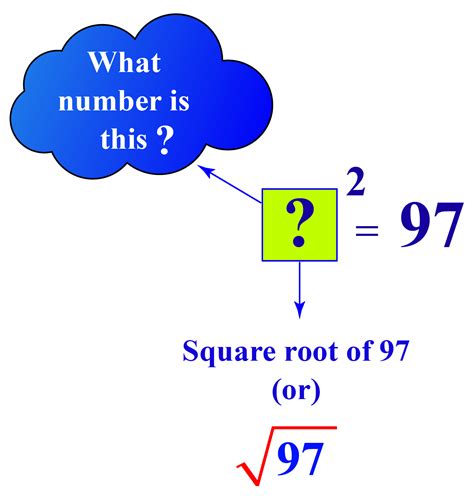What's The Square Root Of 97
News Co
Apr 07, 2025 · 5 min read

Table of Contents
What's the Square Root of 97? A Deep Dive into Approximations and Applications
The seemingly simple question, "What's the square root of 97?" opens a door to a fascinating exploration of mathematical concepts, approximation techniques, and practical applications. While a calculator readily provides a decimal approximation, understanding the underlying methods and implications offers a richer mathematical experience. This article will delve into various ways to find the square root of 97, exploring both precise and approximate solutions, and examining where such calculations are relevant in the real world.
Understanding Square Roots
Before we tackle the square root of 97, let's establish a fundamental understanding. The square root of a number is a value that, when multiplied by itself, equals the original number. For example, the square root of 25 is 5 because 5 x 5 = 25. However, not all numbers have perfect square roots – integers that result in whole numbers. 97 falls into this category; its square root is an irrational number, meaning it cannot be expressed as a simple fraction and its decimal representation continues infinitely without repeating.
Key Concepts:
- Perfect Squares: Numbers that have whole number square roots (e.g., 1, 4, 9, 16, 25...).
- Irrational Numbers: Numbers that cannot be expressed as a ratio of two integers (e.g., π, √2, √97...).
- Approximation: Finding a close estimate of a value, especially when an exact solution is difficult or impossible to obtain.
Methods for Approximating √97
Since 97 isn't a perfect square, we need methods to approximate its square root. Here are a few approaches, ranging from simple estimations to more sophisticated algorithms:
1. Estimation using Perfect Squares
The simplest method involves identifying the nearest perfect squares. Since 97 lies between 81 (9²) and 100 (10²), we know that √97 is between 9 and 10. A rough estimate might place it closer to 10 since 97 is closer to 100 than to 81. This provides a quick, albeit imprecise, answer.
2. The Babylonian Method (or Heron's Method)
This iterative method refines an initial guess to progressively closer approximations. The formula is:
xₙ₊₁ = ½ (xₙ + S/xₙ)
Where:
- xₙ is the current approximation
- xₙ₊₁ is the next approximation
- S is the number whose square root we're seeking (in this case, 97)
Let's start with an initial guess of x₀ = 10:
- x₁ = ½ (10 + 97/10) = 9.85
- x₂ = ½ (9.85 + 97/9.85) ≈ 9.8488578
- x₃ = ½ (9.8488578 + 97/9.8488578) ≈ 9.8488578
Notice how quickly the approximation converges. After just a few iterations, we obtain a very accurate result. This method is remarkably efficient for manual calculations.
3. Linear Interpolation
This method utilizes the relationship between the number and its square root. Knowing that √81 = 9 and √100 = 10, we can linearly interpolate:
Let x be the value and y be its square root. We have the points (81, 9) and (100, 10). The slope of the line connecting these points is (10-9)/(100-81) = 1/19.
Using the point-slope form of a linear equation:
y - 9 = (1/19)(x - 81)
Substituting x = 97:
y - 9 = (1/19)(97 - 81) = 16/19 ≈ 0.842
y ≈ 9.842
This provides a reasonably accurate approximation, though less precise than the Babylonian method.
4. Using a Calculator or Software
Modern calculators and computer software readily provide high-precision approximations of square roots. For √97, most calculators will give a value around 9.848857801796104.
Applications of Square Root Calculations
The calculation of square roots, seemingly abstract, finds numerous practical applications across various fields:
1. Geometry and Physics
Square roots are fundamental in calculating distances, areas, and volumes. For example:
- Pythagorean Theorem: Used to find the length of the hypotenuse of a right-angled triangle (a² + b² = c²). Solving for any side often involves taking a square root.
- Calculating the diagonal of a square or rectangle.
- Determining the magnitude of a vector in physics.
2. Engineering and Architecture
Square roots are vital in various engineering calculations, such as:
- Structural analysis: Calculating stresses and strains in materials.
- Civil engineering: Designing roads, bridges, and buildings.
- Electrical engineering: Calculating impedance and other electrical properties.
3. Statistics and Data Analysis
Square roots appear frequently in statistical calculations:
- Standard deviation: A measure of data dispersion, requiring the square root of the variance.
- Root Mean Square (RMS): Used to calculate the average of fluctuating values (e.g., alternating current).
4. Finance and Economics
Square roots play a role in financial modeling and analysis:
- Portfolio optimization: Determining optimal asset allocation.
- Option pricing: Calculating the value of financial options.
5. Computer Graphics and Game Development
Square roots are essential for:
- Distance calculations: Determining distances between points in 2D or 3D space.
- Vector normalization: Converting vectors to unit length.
- Collision detection: Detecting collisions between objects.
Conclusion
While the question "What's the square root of 97?" might appear simple, it unveils a wealth of mathematical concepts and practical applications. From basic estimations to sophisticated iterative methods like the Babylonian method, there are various ways to find approximations of this irrational number. Understanding these methods provides a deeper understanding of mathematics and its relevance in solving real-world problems across numerous disciplines. The seemingly simple square root calculation is, in reality, a cornerstone of many complex computations that shape our understanding and interactions with the world around us. The approximate value of √97, around 9.8488578, is more than just a number; it's a representation of these powerful mathematical concepts and their pervasive utility.
Latest Posts
Related Post
Thank you for visiting our website which covers about What's The Square Root Of 97 . We hope the information provided has been useful to you. Feel free to contact us if you have any questions or need further assistance. See you next time and don't miss to bookmark.